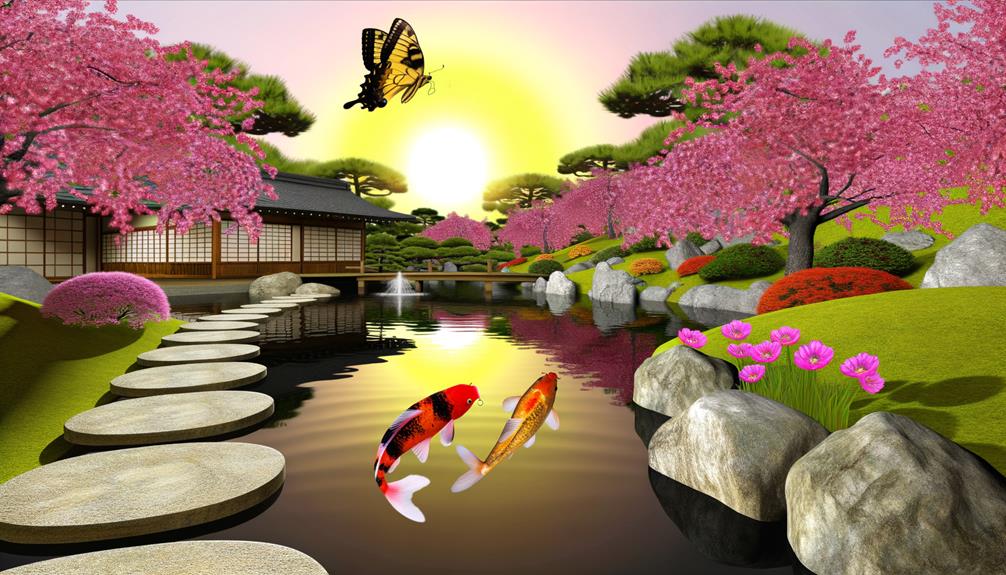Meaning of the Name Momo
The name 'Momo' possesses rich cultural significance and linguistic diversity. In Japanese folklore, it relates to the hero Momotaro, symbolizing courage and resourcefulness.
In African traditions, 'Momo' often denotes an elder or ancestral figure, reflecting respect and wisdom. Literary references, such as Michael Ende's novel, depict 'Momo' as a symbol of innocence and resistance to societal pressures.
Pop culture and digital media have also popularized the name, though sometimes negatively, as seen in the 'Momo Challenge' hoax. Across various languages, 'Momo' can signify youth, growth, and festivity, highlighting its multifaceted nature.
Discover more about its intriguing origins and symbolic meanings.

Key Takeaways
- 'Momo' in Japanese folklore is linked to Momotaro, symbolizing bravery, kindness, and resourcefulness.
- In West African cultures, 'Momo' often refers to a grandmother or elder, signifying respect and wisdom.
- Michael Ende's novel 'Momo' uses the name to explore themes of time and societal pressures.
- The 'Momo Challenge' hoax highlighted the name's viral potential and influence in digital media.
- Linguistically, 'Momo' can mean 'peach' in Japanese or 'bud' in Chinese, symbolizing longevity and growth.
Japanese Folklore
In Japanese folklore, the name 'Momo' is intrinsically linked to the tale of Momotaro, a legendary hero who is said to have emerged from a giant peach. This narrative is deeply embedded in Japanese cultural heritage and serves as a paradigmatic example of mythical storytelling.
Momotaro, literally translating to 'Peach Boy,' symbolizes virtues such as bravery, kindness, and resourcefulness. According to the legend, an elderly couple discovered the peach floating down a river, and upon opening it, found the child within.
Momotaro grew up to become a formidable warrior, setting off on a quest to vanquish ogres that plagued the land. The tale embodies themes of miraculous birth and heroic endeavor, reflecting the cultural values and moral teachings prevalent in Japanese society.
African Traditions
While the name 'Momo' might not be as universally recognized in African traditions, it holds various meanings and connotations across different cultures within the continent.
In certain West African languages, 'Momo' can refer to a grandmother or an elder, embodying respect and wisdom. In addition, in some African ethnic groups, names similar to 'Momo' are often used in rituals and ceremonies to invoke ancestral spirits for guidance and protection. The variances in the name's significance highlight the rich linguistic and cultural diversity across Africa.
Moreover, the name is sometimes employed as a diminutive or affectionate term, underscoring familial bonds and communal values. Through these varied uses, 'Momo' encapsulates essential elements of African social and cultural life.
Literary References
The name Momo holds significant literary value, prominently featured in Michael Ende's novel 'Momo,' where it symbolizes the battle against time and societal pressures.
Additionally, the cultural symbolism of the name extends beyond literature, often representing themes of wisdom and the nurturing aspect of time across various cultural narratives.
This section will explore how Momo functions as a literary and cultural symbol, enriching our understanding of its broader implications.
Momo in Literature
Numerous literary works have explored the name Momo, imbuing it with varied symbolic and thematic significances. The name's literary presence often serves as a focal point for examining complex social and philosophical themes.
Remarkably, Michael Ende's novel 'Momo' stands out, where the protagonist represents innocence and the resistance to societal pressures. Additionally, three remarkable aspects underscore the use of Momo in literature:
- Allegory: Momo often symbolizes deeper moral or ethical dilemmas, prompting readers to reflect on broader societal issues.
- Characterization: Authors use Momo to create memorable, multi-dimensional characters that drive the narrative forward.
- Cultural Context: The name's usage highlights specific cultural and historical milieus, enhancing the richness of the literary work.
Such literary references underscore the multifaceted significance of Momo.
Cultural Symbolism of Momo
Building on its literary nuances, the name Momo also carries profound cultural symbolism, reflecting societal values and collective consciousness across different historical epochs. This name often embodies themes such as innocence, wisdom, and the critique of modernity. Importantly, Michael Ende's novel *Momo* uses the name to personify a child who uncovers the secrets of time, symbolizing the purity and resilience of human spirit against the mechanization of life. In different cultures, 'Momo' has been interpreted in various meaningful ways, as shown below:
| Culture | Symbolism | Literary Reference |
|---|---|---|
| Japanese | Peach Blossom | *Momo no Monogatari* |
| Italian | Childlike Wonder | *Momo* by Michael Ende |
| African | Time and Wisdom | Oral Traditions |
| Chinese | Mythical Creature | Journey to the West |
| Greek | Satirical Critique | Myth of Momus |
Such diverse interpretations enrich the cultural tapestry surrounding the name Momo.
Pop Culture Impact
Emerging as a cultural phenomenon, the name Momo has greatly influenced various domains of pop culture, including literature, film, and digital media. Its pervasive presence can be analyzed through several key instances:
- Literature: Michael Ende's novel 'Momo' explores themes of time and societal pressures, embedding the name deeply in literary discussions.
- Film: The name has been featured in various films and animated series, often symbolizing quirky or enigmatic characters.
- Digital Media: The 'Momo Challenge' hoax on social media highlighted the name's viral potential, albeit controversially.
Each of these instances underscores the name Momo's multifaceted role in shaping contemporary cultural narratives, demonstrating its resonance and adaptability across different mediums and contexts.
Linguistic Origins
While the name Momo has left a significant mark on pop culture, its linguistic origins offer a deeper understanding of its versatility and appeal. The name Momo can be traced back to several languages, each imbuing it with unique meanings and cultural significance.
| Language | Meaning |
|---|---|
| Japanese | Peach, Hundred |
| Chinese | Bud, Flourish |
| Italian | Mask, Jest |
In Japanese, "桃" (Momo) signifies "peach," symbolizing longevity and youth. In Chinese, "莫莫" (Mò Mò) can mean "bud" or "flourish," representing growth and prosperity. The Italian interpretation, derived from "Maschera di Momo," refers to a traditional mask, evoking notions of festivity and jest. These varied linguistic roots contribute to Momo's broad cultural resonance.
Modern Usage
In contemporary contexts, the name Momo has gained substantial traction through its presence in pop culture, especially in literature, film, and music.
Additionally, social media platforms have amplified its usage, often associating it with viral trends and internet phenomena.
This section examines how these modern influences have shaped the public's perception and adoption of the name Momo.
Pop Culture Influence
The name 'Momo' frequently appears in various facets of modern pop culture, spanning from internet phenomena to mainstream entertainment. Its influence can be observed in several key areas:
- Anime and Manga: The character Momo Yaoyorozu from the popular series 'My Hero Academia' has brought the name significant recognition in the anime community.
- Music Industry: Momo Hirai, a member of the South Korean girl group TWICE, has contributed to the name's prevalence in the global music scene.
- Literature: The novel 'Momo' by Michael Ende, often lauded for its profound philosophical themes, remains a classic in contemporary literature.
These instances illustrate how 'Momo' has permeated various domains, thereby cementing its place in modern cultural lexicon.
Social Media Trends
Across contemporary social media platforms, the name 'Momo' has gained substantial traction, often appearing in trending hashtags and viral challenges. This phenomenon can be attributed to various factors, including the proliferation of memes and the influence of digital content creators.
Noteworthy, the 'Momo Challenge,' a viral hoax, catalyzed widespread attention, albeit controversially. The name has also been popularized through its association with characters in anime and K-pop idols, such as Momo Hirai from the group TWICE.
Additionally, 'Momo' is frequently utilized in user-generated content, indicating a mix of cultural references and personal expression. This digital omnipresence underscores the name's versatility and its ability to resonate across diverse social strata and online communities.
Symbolic Meanings
How does the name 'Momo' encapsulate a myriad of symbolic meanings across different cultures and contexts? This name, though seemingly simple, bears profound significance:
- Cultural Symbolism: In Japanese culture, 'Momo' signifies the peach, a symbol of longevity and immortality. This reflects deep-rooted cultural beliefs in the regenerative power of nature.
- Literary References: Michael Ende's novel 'Momo' portrays the name as a representation of time and human connection, embodying themes of resistance against time theft and societal pressures.
- Modern Contexts: In contemporary settings, 'Momo' has gained notoriety through the viral 'Momo Challenge,' which symbolizes the darker side of internet culture and the psychological impact of digital media.
Thus, 'Momo' serves as a multifaceted symbol, resonating differently across various cultural and contextual landscapes.
Conclusion
In summation, the name 'Momo' manifests myriad meanings, merging mythological motifs and modern manifestations.
Japanese folklore features fantastical figures, while African traditions tie it to tribal tales.
Literary references reveal rich resonances, and pop culture underscores its ubiquitous usage.
Linguistically, 'Momo' crisscrosses continents, contributing to contemporary contexts.
Each symbolic significance strengthens the name's societal stature, showcasing a synthesis of cultural connotations.
Consequently, 'Momo' epitomizes an eclectic emblem, embodying extensive etymological and existential elements.






